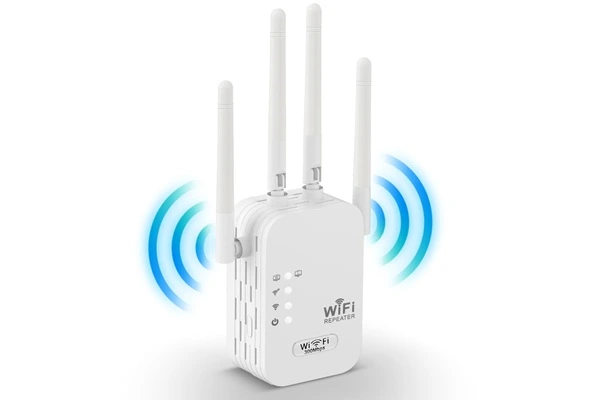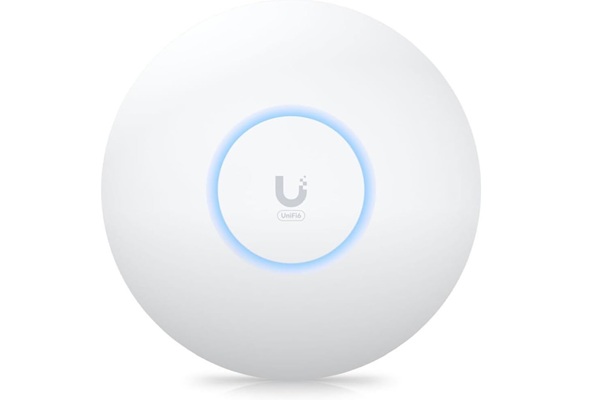
|
|
Understanding Wi-Fi Extender vs. Wireless Access Point
They are not the same!

Have you ever noticed your Wi-Fi slowing down or disappearing in certain
parts of your home? Many people try fixing this problem with a Wi-Fi extender — but
these devices often don’t work the way most expect. The terminology is what makes this a
bit confusing as to what it actually does.
What a Wireless Range Extender Actually Does
Your Wi-Fi router sends out a wireless signal. The farther you move from it,
the weaker that signal becomes, and your internet speed drops. A Wi-Fi extender (shown
above) is sometimes called a “repeater”. picks up this weakened signal and re-broadcasts
it to reach farther distances. An extender simply plugs directly into a wall outlet
and requires little or no configuration. This simplicity makes it an attractive choice
for homeowners. However, it’s important to understand that an extender does
not make your Wi-Fi faster — it simply repeats the same weakened signal
over a wider area to extend the range.
This means that while you may see more “bars” on your device, the actual internet
performance may still be slow or unstable. Wi-Fi extenders can be useful in some cases,
but they’re generally not the best way to fix poor coverage.
Here is another way to explain it using numbers. Let's assume the speed and signal
strength at the router is 100%. You move to an area where you have a poor signal. It's
now at 40% and the speed is degraded by that amount. If you install a repeater/extender
here; the signal will go up to 100% but the speed will remain at the 40%. You have
only extended the range but not the speed. This may be fine for printers, light bulbs, &
thermostats but may be too slow for streaming, gaming or working from home.
The Better Option: Access Points

For faster and more reliable Wi-Fi coverage, the better solution is to use one or more
access points (APs). These devices are designed specifically to
broadcast Wi-Fi and connect directly to your router with an Ethernet cable. Access
points are often mounted on the ceiling or wall but can also lay on a flat
surface.
By placing access points in areas with weak signals, you can create multiple strong
Wi-Fi zones throughout your home or building. Each access point transmits a
full-strength signal because it’s connected by ethernet, not by repeating a weak
wireless one.
This is the same setup used in schools, hospitals, and office buildings. Depending on
your space, you may need just two access points — or dozens — to achieve complete
coverage.
Example Devices
- Linksys MR9000: A versatile home consumer device that can function either way. It can be used as an extender, or wired access point through its firmware settings. It has multiple ports on the side. This is one example. There are others.
- GLI Routers Flint 2 and Flint 3: These affordable line of routers can be configured as a full router OR as an access point using their “repeater mode.” This is probably the best choice for home use but may be slightly more expensive.
- Ubiquiti Unifi: A professional-grade system that supports dozens of access points with centralized software control — ideal for businesses and large homes. Most of the models look flying saucers. (Shown above.)
- Cisco Wi-Fi Systems: Designed for mission-critical environments like hospitals and large enterprises, offering advanced centralized management and reliability. This will be, (by far), the most expensive option.
Additional Facts About Wi-Fi Coverage
- Walls, floors, and metal objects can weaken Wi-Fi signals.
- Higher frequencies (like 5 GHz and 6 GHz) provide faster speeds but shorter range than 2.4 GHz.
- Placing your router in a central location can help balance coverage throughout your home.
- Newer technologies, such as Wi-Fi 6 and Wi-Fi 6E, can handle more devices efficiently and with less interference.
- Using wired access points or mesh systems is the preferred solution for large or multi-story homes.
The bottom line:
Wi-Fi extenders may seem convenient, but they don’t truly fix poor signal strength.
Investing in proper access points will provide a stronger, faster, and more
consistent connection throughout your home or business.
You will need to run an ethernet line to each wireless access point but it's truly worth
the effort in the long run.